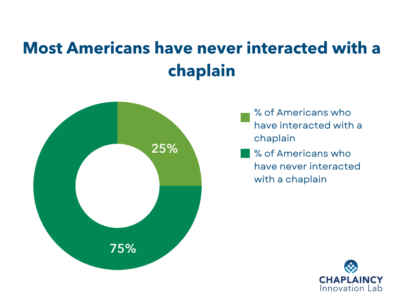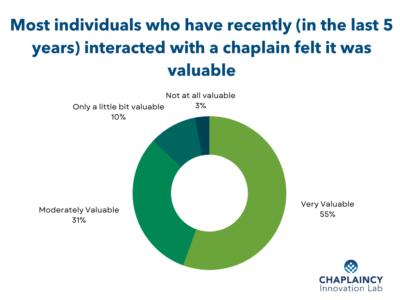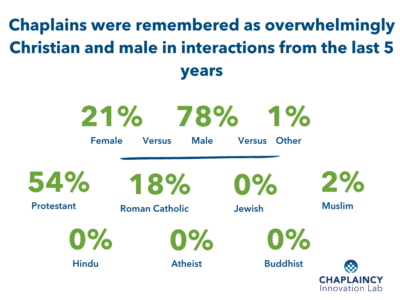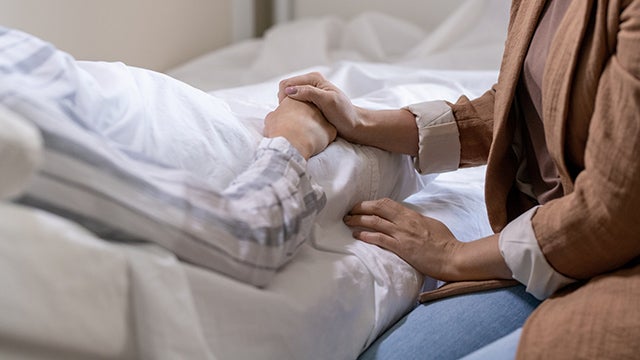Last March, we at the Chaplaincy Innovation Lab partnered with Gallup to conduct the first detailed national survey about the general population’s interactions with chaplains. Chaplains are spiritual care providers who work outside of churches and other places of worship, in secular settings such as hospitals, the military, universities, and prisons. Chaplains provide spiritual care to all faiths and none, regardless of their own religious tradition. Until now, little data about how the general population interacts with chaplains has been available. The new survey the Chaplaincy Innovation Lab provides answers two important questions: Who do chaplains care for? And how do people experience those interactions?
Gallup collected responses from over 1,000 people across the U.S. About 25% of Americans reported interacting with a chaplain at some time during their lives. Fourteen percent of Americans interacted with a chaplain in the past five years. About half of interactions took place in healthcare settings, including hospitals, palliative care, or hospice. The word most commonly used to describe chaplains by those who had interacted with a chaplain was “compassionate” (selected by 95% of respondents). The full report on the survey results, with additional detail and data, is available on the Lab’s website.

Recipients of spiritual care reflect the diversity of the general population. In most social scientific studies, race, gender, education, and/or geographic location are good ways to predict religious behaviors, but this did not hold true for chaplain interactions. Equitable access to spiritual care is important because survey respondents overwhelmingly reported a chaplain’s care to be a valuable and helpful resource, not only in times of crisis but also in more mundane, day-to-day interactions. The survey results confirm the Lab’s belief that spiritual care is an essential aspect of the modern religious landscape for all Americans, and that ensuring equal access to spiritual care must be a priority for the many institutions where chaplains work.

Chaplains seem to be serving the whole population, but while recipients of care are diverse, providers of spiritual care, or chaplains, are less diverse. Chaplaincy has a way to go if we hope to match the diversity of recipients with the diversity of providers. Historically, the leaders and gatekeepers in professional chaplaincy were overwhelmingly white, male, and Christian. The profession has feminized and slowly diversified, but much progress needs to be made. Despite the long and important history of Black chaplains in the United States, Black chaplains and other chaplains of color are underrepresented among board-certified chaplains, a challenge the Lab is addressing through a range of efforts.
These survey results illustrate that most people remembered interacting with a chaplain who was male (over 80% of interactions) and who was perceived to be Christian (over 70% of interactions). This may not reflect the true population of chaplains in the United States, but it does reflect who people think of when asked to recall a chaplain with whom they have interacted. We must ask what sorts of barriers have created such a homogeneous field, and if this homogeneity is really in the interest of robust, effective spiritual care. Justice and effectiveness are both arguments in favor of diversifying the field of spiritual caregivers to more closely mirror the broader population.

The Chaplaincy Innovation Lab is committed to building a more diverse pipeline of future chaplains through partnerships with theological schools with diverse constituencies and historically Black seminaries. The Lab’s website offers resources for everyone exploring chaplaincy, and we are prioritizing new materials for chaplains of color and non-Christian chaplains. The pipeline for future chaplains must be as diverse in terms of race, ethnicity, religion/spirituality, sexuality, and gender expression as the United States is today.
Chaplaincy is more than just a profession—it is a set of spiritual practices that are grounded in forging human connection. In support of these important human connections, we must work to ensure that chaplaincy truly is for everyone.
Amy Lawton is a postdoctoral scholar at the Chaplaincy Innovation Lab at Brandeis University. Amy completed her PhD in sociology at the University of Connecticut. Her research interests focus on the potential and paradox of religious pluralism in the United States, the cultural production of the sacred, and meaning-making in both religious and non-religious belief systems.


